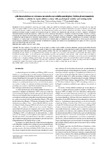Adicción al atletismo en veteranos: un estudio con variables psicológicas y hábitos de entrenamiento

Use este enlace para citar
http://hdl.handle.net/2183/37528Colecciones
- Investigación (FCS) [1293]
Metadatos
Mostrar el registro completo del ítemTítulo
Adicción al atletismo en veteranos: un estudio con variables psicológicas y hábitos de entrenamientoTítulo(s) alternativo(s)
Addiction to athletics in master athletes: a study with psychological variables and training habitsFecha
2019Cita bibliográfica
Zarauz Sancho, A., Ruiz Juan, F., & Arufe Giráldez, V. (2019). Adicción al atletismo en veteranos: un estudio con variables psicológicas y hábitos de entrenamiento. Retos: nuevas tendencias en educación física, deporte y recreación, 35, 201-207. https://doi.org/10.47197/RETOS.V0I35.67472
Resumen
[Resumen]: El objetivo principal del estudio fue, por un lado, evaluar qué variables de satisfacción intrínseca, percepción y creencias sobre las causas del
éxito en el deporte influían en tener un perfil de adicción deportiva alto o bajo y, por otro, analizar las diferencias en el grado de adicción y sus subescalas
en función de diversas variables de entrenamiento. Se administraron las pruebas a una muestra voluntaria de 401 atletas veteranos participantes en
pruebas de atletismo en pista. Se partió de la hipótesis de que los veteranos con puntuaciones más elevadas en placer y relajación, normalmente
obtendrían también correlaciones positivas y valores altos en los constructos más positivos y deseables (orientación a la tarea, esfuerzo y diversión),
mientras que los veteranos con puntuaciones más elevadas en tolerancia, carencia de control y en abstinencia y ansia, obtendrían correlaciones positivas
y puntuaciones más elevadas en los constructos menos positivos y deseables (empleo de técnicas de engaño y aburrimiento). Los resultados confirmaron
la hipótesis y se concluyó que lo recomendable sería entrenar en un reducido grupo de compañeros que colaboren entre sí, sin la exigencia competitiva
de un entrenador, centrándose en la tarea de ejecutar con habilidad los complejos movimientos de su especialidad para ser capaces de volver a lograr una
marca que hacía tiempo que no lograban [Abstract]: The main objective of the study was, on the one hand, to evaluate which variables of intrinsic satisfaction, perception and beliefs about the
causes of success in sports influenced in having a profile of high or low sports addiction and, on the other hand, to analyze the differences in the degree
of addiction and its subscales according to various training variables. The tests were administered to a volunteer sample of 401 veteran athletes
participating in track athletics. It was hypothesized that veterans with higher scores in pleasure and relaxation would normally also obtain positive
correlations and high values in the most positive and desirable constructs (task orientation, effort and fun), while veterans with scores higher in
tolerance, lack of control and in abstinence and anxiety, they would obtain positive correlations and higher scores in less positive and desirable
constructs (use of deception techniques and boredom). The results confirmed the hypothesis and it was concluded that it would be advisable to train in
a small group of colleagues who collaborate with each other, without the competitive requirement of a trainer, focusing on the task of skillfully
executing the complex movements of their specialty to be able to return to achieve a brand that had not achieved.
Palabras clave
Adultos
Ejercicio
Salud
Atletas
Adults
Exercise
Health
Athletes
Ejercicio
Salud
Atletas
Adults
Exercise
Health
Athletes
Versión del editor
Derechos
Atribución 3.0
ISSN
1579-1726






